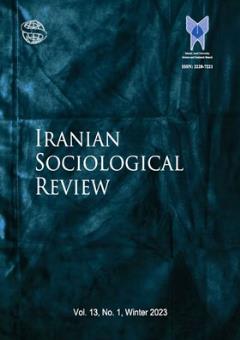Identifying and Ranking the Effective Variables of Artificial Intelligence-based Media Platform Management
Subject Areas : Iranian Sociological Review
Yousof Hodaie
1
![]() ,
Nazanin Malekian
2
,
Akbar Nasrollahi
3
,
Nazanin Malekian
2
,
Akbar Nasrollahi
3
![]()
1 - Ph.D. Student in Media Management, Faculty of Humanities, West Tehran Branch, Islamic Azad University, Tehran, Iran
2 - Associate Professor, Department of Cultural and Media Studies, Central Tehran Branch, Islamic Azad University, Tehran, Iran
3 - Associate Professor, Department of Media Management, Central Tehran Branch, Islamic Azad University, Tehran, Iran
Keywords: management of media platforms, artificial intelligence, social media, technology and information, foundation data,
Abstract :
In today's fast-paced digital world, the media landscape is constantly changing, with new technologies and developments shaping the way information is disseminated and consumed. One of the most important developments in recent years has been the integration of artificial intelligence (AI) into media management. Artificial intelligence has changed the way media organizations operate, from content production to distribution and audience attraction, control and monitoring of revenue. In this article, we will examine the impact of artificial intelligence on media management and how it will shape the media industry. This research is a descriptive-inductive type of research that deals with the qualitative method (foundation data) to discover, describe, describe and model their characteristics. In terms of how to collect the required data, the present research is classified in the "exploratory qualitative research" group. Since the participants in qualitative type of research are not determined before conducting the research, rather the interview process is carried out until no new data is obtained and data saturation is reached. Conducting interviews in the present study reached saturation with 18 people. All the indicators obtained from the open coding stage were determined in this stage and 15 main categories and 74 sub-categories were obtained and a paradigm model was discovered from it, the main categories include: laws and regulations of the country in order to apply technology, experience management and User satisfaction, analyzing and solving management challenges by artificial intelligence-based systems, government support, data and software infrastructure, public and social infrastructure
Govindaraj, M., Gnanasekaran, C., Sivakulanthay, T., Gnanamanickam, S. V., Khan,P. (2023). Role of Artificial Intelligence Across Various Media Platforms: A Quantitative Investigation of Media Expert's Opinion
Sutrisno, Ausat, A. M. A., Permana, B., & Harahap, M. A. K. (2023). Do Information Technology and Human Resources Create Business Performance: A Review.International Journal of Professional Business Review,8(8), e02206. https://doi.org/10.26668/businessreview/2023.v8i8.2206
Haleem, A., Javaid, M., Asim Qadri, M., Pratap Singh, R., & Suman, R. (2022). Artificial Intelligence (AI) applications for marketing: A literature-based study. International Journal of Intelligent Networks, 3(3), 119–132.
Sadiku, M. N. O., Ashaolu, T. J., Ajayi-Majebi, A., & Musa, S. M. (2021). Artificial Intelligence in Social Media. International Journal of Scientific Advances, 2(1), 2708-7972.
Gkikas, D. C., & Theodoridis, P. K. (2019). Artificial Intelligence (AI) impact on Digital Marketing Research. Strategic Innovative Marketing and Tourism. 4(2). 1251–1259.
Grandinetti, R. (2020). How artificial intelligence can change the core of marketing theory. Innovative Marketing, 16(2), 91–103
Resqi, M. (2022). Marketing Communications: A Bibliometric Study In The Use Of Technology And Social Media For Marketing [Komunikasi Pemasaran: Studi Bibliometrik Dalam Penggunaan Teknologi Dan Media Sosial Untuk Pemasaran]. Volume 3, (October), 4194–4203.
Krajčovič, P. (2024). The use of artificial intelligence in the marketing communications of micro-enterprises. In T. Klieštik (Ed.), Globalization and its socio-economic consequences: 23rd international scientific conference (pp. xx-xx). Žilina: Žilinská univerzita v Žiline. (in press)
Davidson, T., Warmsley, D., Macy, M., & Weber, I. (2023). Automated hate speech detection and the problem of offensive language. In Proceedings of the 11th International AAAI Conference on Web and Social Media (ICWSM '17), Vol. 17 (pp. 512–515).
Argan, M., Dinc, H., Kaya, S., & Argan, M. T. (2022). Artificial Intelligence (AI) in Advertising: Understanding and Schematizing the Behaviors of Social Media Users. ADCAIJ: Advances in Distributed Computing and Artificial Intelligence Journal Regular Issue, 11(3), 331-348
Thormundsson, B. (2023, October 26). Artificial Intelligence (AI) market size/revenue comparisons 2018-2030. Retrieved from https://www.statista.com/statistics/941835/artificial-intelligence-market-size-revenue-comparisons/
Gao, J., Bi, W., Liu, X., Li, J., & Shi, S. (2019). Generating multiple diverse responses for short-text conversation. In Proceedings of the AAAI Conference on Artificial Intelligence (pp. 6383-6390).
Enehano. (2023, April 20). Slovensko vo využívaní umelej inteligencie predbehlo susedov. Technológie však nemôžu fungovať bez ľudí. https://www.enehano.sk/blog/napisali-o-nas-slovensko-vo-vyuzivani-umelej-inteligencie-predbehlo-susedov-technologie-vsak-nemozu-fungovat-bez-ludi
Osambela, J. E. S. de, Pimentel, J. F. F., & Arenas, R. D. (2023). Endomarketing Management and Staff Engagement of a Municipality in Peru.International Journal of Professional Business Review,8(8), e03009. https://doi.org/10.26668/businessreview/2023.v8i8.3009
Surikova, J., Siroda, S., & Bhattarai, B. (2022). The role of Artificial Intelligence in the evolution of Brand Voice In Multimedia. Molung Educational Frontier, 12(01), 73–103.
Nair, K., & Gupta, R. (2021). Application of AI technology in Modern Digital Marketing Environment. World Journal of Entrepreneurship, Management and Sustainable Development. 1(1
Koohang, J.H. Nord, K. Ooi, G.W. Tan, M. Al-Emran, E.C. Aw, A. M. Baabdullah, D. Buhalis, T. Cham, C. Dennis, V. Dutot, Y.K. Dwivedi, L. Hughes, E. Mogaji, N. Pandey, I. Phau, R. Raman, A. Sharma, М. Σιγάλα, L. Wong, (2024) , Shaping the Metaverse into Reality: a Holistic Multidisciplinary Understanding of Opportunities, Challenges, and Avenues for Future Investigation, Journal of Computer Information Systems 63 (3) (2024) 735–765, https://doi.org/10.1080/ 08874417.2023.2165197.
Thieme, M. Hanratty, M. Lyons, J. Palacios, R.F. Marques, C. Morrison, G. Doherty, (2023) Designing human-centered AI for mental Health: developing clinically relevant applications for online CBT treatment, ACM Transactions on Computer-Human Interaction 30 (2) (2023) 1–50, https://doi.org/10.1145/ 3564752
H. Kang, C. Lou,(2022) , AI agency vs. human agency: understanding human–AI interactions on TikTok and their implications for user engagement, Journal of Computer-Mediated Communication (5) (2022) 27, https://doi.org/10.1093/ jcmc/zmac014


